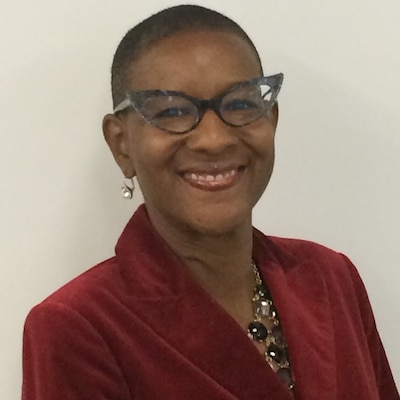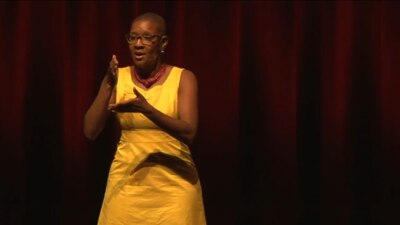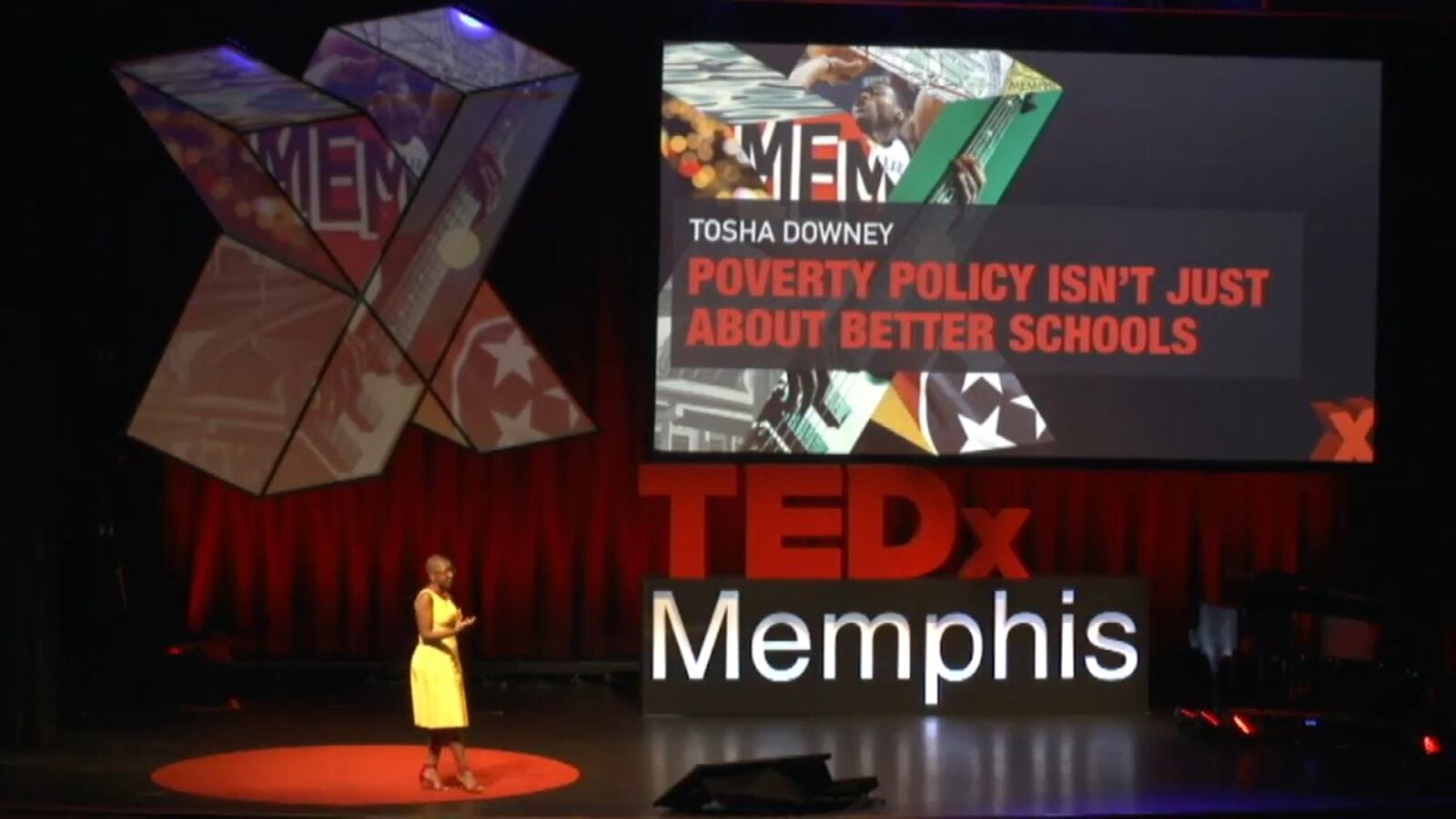At first, Memphis native Tosha Downey was hesitant to continue work in education in her hometown, where she had watched poverty and policies stymie student growth. But she knew her experience was well suited to connect advocacy organizations, both with each other and to the needs of poor students in Memphis.
A graduate of Central High School, Downey is a first-generation college graduate. She earned a bachelor’s degree from Clark Atlanta University, a master’s in public policy from the University of Michigan, and a law degree from the University of North Carolina at Chapel Hill. Some 25 years after leaving Memphis, including working for a nationally recognized charter school network in Chicago, Downey returned in 2015 as advocacy director for Teacher Town, a citywide teacher development and recruitment initiative funded by local and national philanthropists. (Disclosure: Some of Teacher Town’s funders also support Chalkbeat. You can see our full list of supporters here.)

Downey, 43, recently was featured in TEDxMemphis, an independently organized event to highlight and share ideas from Memphis movers and shakers. Her talk was titled “poverty policy isn’t just about better schools.” Chalkbeat sat down later with Downey to hear more. Here are the highlights, condensed for brevity.
What propelled you into this work?
Looking at the fact that I grew up poor, one of the most important things to me was fighting to end poverty and that education was a key component of that fight. But as I reflected about my life and the lives of people around me, all of us poor kids were connected to our families. And even though we got connected to great opportunities, our families were still deeply embedded in poverty. No matter the education policies that helped carry us, the people we most cared about were still in poverty. So it’s hard to leave your family and walk away from that when they are in poverty.
When did you come to that conclusion?
My work in Chicago centered around college access, and that’s when it really hit home for me. I had kids who got accepted to great summer programs at Northwestern (University) but, because they had to stay home to help with siblings, they couldn’t go. It was incident after incident after incident like that. One of my high school classmates was much smarter than me and her mother, grandmother and aunt were all on drugs. She was eligible for a lot of the programs for smart kids, but she couldn’t go because she was taking care of younger siblings. The parallel of her life has been visceral for me.
Why is it important to include the fight against poverty in education advocacy work?
I think over time we have narrowed our focus to just making better schools. And I think that narrow focus lets other systems at play off the hook. When I talk to Superintendent Dorsey Hopson or iZone Superintendent Sharon Griffin or Achievement School District Superintendent Malika Anderson and every principal, kids are coming in hungry. They may have a great school and great curriculum, but kids can’t learn when they’re hungry. Or they don’t come to school because of transportation or they don’t have clean clothes because Mom doesn’t have a washer and dryer and no money for the laundromat. Those are not excuses. Those are real obstacles. These are realities our families face. This really does impact the ability of teachers and principals to turn a school around. So in Chicago, we connected organizations to these needs and even had washers and dryers in some schools. This is where those discretionary federal dollars need to go. The better we get at mitigating some of those external factors, the better opportunity those kids will have for success.
"… Over time we have narrowed our focus to just making better schools. And I think that narrow focus lets other systems at play off the hook."
Where do you hear rhetoric of avoiding dealing with poverty in education work?
I think it’s mostly that narrow focus, but you do hear it in state legislatures. (For instance,) the fight against expanding Medicaid in Tennessee for kids without access to quality health care.
And we have a school funding formula based on property taxes where poor neighborhoods have low property values. The state funding formula is not weighted in such a way that accounts for the extreme levels of poverty or disability that some schools have so they can get the heightened needs of those students. We need to have a funding formula that is mindful of the student population.
How can schools and communities help students overcome those external barriers?
Well, instead of outright punishing students for being late to school, find out why. I’ve seen students who came late because their mom’s ride from working the night shift was late and they had to stay home until she got there so they wouldn’t leave their little brother or little sister at home. What if for that particular student you worked out a solution where they can bring their little brother or sister to school and have their breakfast with them like they normally would and just have mom pick them up from there? Or if they just have trouble getting up in the morning, why not send out a robocall at 7 a.m.? It doesn’t have to be large sweeping policy tools, but you can still find systematic, creative solutions to help kids succeed. But to be fair, educators are already doing a million things. That’s why you have community partners to help with those solutions so teachers can teach.

At TEDxMemphis, you talked about being a gladiator for your kids. Shout out to Shonda Rhimes’ “Scandal,” right?
Yes! When I worked for Noble Network, we did a skit for our staff based on a scene in (the TV show) “Scandal” when they are trying to figure out if they were going to do the right thing or the wrong thing. And we asked each other just like they did: “Are we gladiators or are we bitches?” They called my boss the “white Olivia Pope.”
Our team’s job was wherever there was a problem, we were there to fix it. And that was everything from a school leader who had a student who was killed and we mobilized social workers to get there — to a principal accused as part of a Department of Justice investigation on discipline outcomes. We handled it and pulled the data. Our external affairs team was responsible for raising the money, communicating the message, and protecting the interest of our schools and our 12,000 high-performing black and Latino students. The educators didn’t need to be worrying about these issues. They had students to teach!
How does this apply to conversation around education in Memphis?
When I talk to parents in poverty who really want their kids to go to the same schools they went to, I have to ask: But how did that work for you? Based on the education you got, were you able to break the cycles of poverty based on the education you got? And if you weren’t, what was the role the school did or did not play in that happening in your life? And being able to ask those questions and change that narrative for people. There’s a status quo that’s fighting to stay the same and a reform narrative that’s fighting to change things. And it’s so hard because a lot of this work focuses on the adults and it really needs to focus on the kids. Adults have to have some very uncomfortable experiences in order for kids to have better experiences. We run schools. We don’t run employment agencies. To the extent adults are willing to move the needle for kids socially, emotionally, intellectually, you can inspire kids to be better. School needs to be the one place kids want to be. And if not, we need to fight to make it happen.
Editor’s note: Periodically, Chalkbeat Tennessee conducts Chalk Talk interviews with a leader, innovator, influential thinker or hero across Tennessee’s education community. We invite readers to email Chalkbeat at tn.tips@chalkbeat.org with your suggestions for future subjects.


